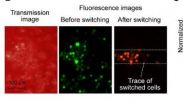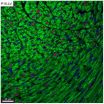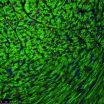(Press-News.org) Single-cell genomics could provide new insight into the biology of Malaria parasites, including their virulence and levels of drug resistance, to ultimately improve treatment and control of the disease, according to new research funded by the Wellcome Trust and the National Institutes of Health.
The findings are revealed in a study by researchers at the Texas Biomedical Research Institute and published today in the journal Genome Research.
Malaria infections commonly contain complex mixtures of Plasmodium parasites which cause the disease. These mixtures, known as multiple genotype infections (MGI's), can alter the impact of the infection due to parasites competing with one another and can drive the spread of drug resistance. MGI's are extremely common in regions with high levels of malaria infection but their biology is poorly understood.
"Up to 70 per cent of infections in sub-Saharan Africa are MGI's and we currently don't know how many genotypes are present and whether parasites come from a single mosquito bite or multiple mosquito bites" says Shalini Nair, first author on the paper.
Current genome sequencing techniques involve the chemical disintegration of samples of red blood cells from infected patients to obtain parasite DNA, which are then sequenced. This grouped sequencing cannot account for variations between individual parasites found in cells.
Single cell genomics allows the separation and isolation of cells to extract and sequence individual parasite DNA and determine any differences between the parasites within an infection.
"Current sequencing techniques really limit our understanding of malaria parasite biology" says Dr. Ian Cheeseman, who led the study. "It's like trying to understand human genetics by making DNA from everyone in a village at once. The data is all jumbled up, but what we really want is information from individuals."
The team used methods of single cell-sorting and whole genome amplification to separate out individual cells and amplify their DNA for sequencing directly from infected red blood cells. The use of single-cell genomics allows sequencing of individual parasites directly from a patient's blood.
The technique allows a comprehensive description of the composition of MGIs, and will reveal information on the strength of an infection and the development of drug-resistance, which can inform disease control interventions.
Though the technology is currently too expensive and demanding for routine use in the clinic, as the technology matures the applications for understanding malaria biology are vast.
Dr Michael Dunn, Head of Genetics and Molecular Sciences at the Wellcome Trust said: "Malaria remains one of the biggest killers in the world today despite decades of control efforts. Any insight into the fundamental genetics and overall biology of the disease is valuable to improve future interventions and reduce rates of infection and mortality".
Two forms of malaria parasites were sequenced in the study; Plasmodium falciparum (responsible for up to 700,000 deaths per year) and Plasmodium vivax (responsible for 20 million infections per year).
INFORMATION:
The work was conducted in collaboration with Francois Nosten and Standwell Nkhoma, and Wellcome Trust funded researchers from Thailand and Malawi. Further application of single-cell genomics are planned in both countries.
New genomics technique could improve treatment and control of Malaria
2014-05-08
ELSE PRESS RELEASES FROM THIS DATE:
Open science journal publishes attempt to reproduce high-profile stem cell acid bath study
2014-05-08
In a study published today in F1000Research, Professor Kenneth Lee of the Chinese University of Hong Kong reveals the full experimental results of an attempt to replicate a controversial study published in Nature recently that suggested that bathing somatic cells in acid can reprogram them to induced pluripotent stem cells (iPS cells). With systematically collected and fully available data, Lee and his colleagues report that carefully replicating the original acid-treatment method does not induce pluripotency in two types of mouse somatic cells, including those used in ...
NASA sees system 90E moving toward southwestern Mexico
2014-05-08
A tropical low pressure area known as System 90E is located a couple of hundred miles southwest of Zihuatenejo, Mexico today and was seen by NASA's Terra satellite on its way to a landfall.
The Moderate Resolution Imaging Spectroradiometer (MODIS) instrument aboard NASA's Terra satellite captured a visible image of System 90E on May 7 at 18:50 UTC/ 2:50 p.m. EDT as it headed to a landfall in southwestern Mexico. The low appeared disorganized as it approached the southwestern coast of Mexico near the states of Michoacan and Guerrero.
According to NOAA's National Hurricane ...
Recycling a patient's lost blood during surgery better than using banked blood
2014-05-08
Patients whose own red blood cells are recycled and given back to them during heart surgery have healthier blood cells better able to carry oxygen where it is most needed compared to those who get transfusions of blood stored in a blood bank, according to results of a small study at Johns Hopkins.
In a report for the June issue of the journal Anesthesia & Analgesia, the researchers say they found that the more units of banked blood a patient received, the more red cell damage they observed. The damage renders the cells less flexible and less able to squeeze through a ...
Few women at high-risk for hereditary breast and ovarian cancer receive genetic counseling
2014-05-08
Mutations in the BRCA1 and BRCA2 genes account for nearly 25 percent of hereditary breast cancers and most hereditary ovarian cancers, yet a study by cancer prevention and control researchers at Virginia Commonwealth University Massey Cancer Center suggests an alarmingly small amount of women who qualify for BRCA genetic counseling actually receive the services. Additionally, they found that a significant proportion of women with a family history of breast and ovarian cancer underestimate their own risk.
The study, published in the April edition of the Journal of Community ...
Anti-aging factor offers brain boost too
2014-05-08
A variant of the gene KLOTHO is known for its anti-aging effects in people fortunate enough to carry one copy. Now researchers find that it also has benefits when it comes to brain function. The variant appears to lend beneficial cognitive effects by increasing overall levels of klotho in the bloodstream and brain.
What's more, the improvements in learning and memory associated with klotho elevation aren't strictly tied to aging. They do occur in aging mice, but also in young animals, according to a report published in the Cell Press journal Cell Reports on May 8th. ...
What vigilant squid can teach us about the purpose of pain
2014-05-08
Most of us have probably felt that lasting sense of anxiety or even pain after enduring some kind of accident or injury. Now, researchers have the first evidence in any animal that there may be a very good reason for that kind of heightened sensitivity—or at least there is in the battle of squid versus fish. Squid that behave with extra vigilance after experiencing even a minor injury are more likely to live to see another day, according to a report appearing in the Cell Press journal Current Biology on May 8.
The findings suggest that behaviors that appear counterproductive ...
Antibiotic resistance genes are essentially everywhere
2014-05-08
The largest metagenomic search for antibiotic resistance genes in the DNA sequences of microbial communities from around the globe has found that bacteria carrying those vexing genes turn up everywhere in nature that scientists look for them. The findings reported in the Cell Press journal Current Biology on May 8 add to evidence showing just how common and abundant those resistance genes really are in natural environments.
This big-picture, ecological view on a growing healthcare concern emphasizes the important relationship between antibiotic resistance in the clinic ...
New technology using florescent proteins tracks cancer cells circulating in the blood
2014-05-08
After cancer spreads, finding and destroying malignant cells that circulate in the body is usually critical to patient survival. Now, researchers reporting in the Cell Press journal Chemistry & Biology have developed a new method that allows investigators to label and track single tumor cells circulating in the blood. This advance could help investigators develop a better understanding of cancer spread and how to stop it.
Cancer spread, or metastasis, leads to up to 90% of cancer deaths. Investigators currently do not have the clinical capability to intervene and stop ...
Spurt of heart muscle cell division seen in mice well after birth
2014-05-08
The entire heart muscle in young children may hold untapped potential for regeneration, new research suggests.
For decades, scientists believed that after a child's first few days of life, cardiac muscle cells did not divide. Instead, the assumption was that the heart could only grow by having the muscle cells become larger.
Cracks were already appearing in that theory. But new findings in mice, scheduled for publication in Cell, provide a dramatic counterexample -- with implications for the treatment of congenital heart disorders in humans.
Researchers at Emory University ...
Discovery that heart cells replicate during adolescence opens new avenue for heart repair
2014-05-08
It is widely accepted that heart muscle cells in mammals stop replicating shortly after birth, limiting the ability of the heart to repair itself after injury. A study published by Cell Press May 8th in the journal Cell now shows that heart muscle cells in mice undergo a brief proliferative burst prior to adolescence, increasing in number by about 40% to allow the heart to meet the increased circulatory needs of the body during a period of rapid growth. The findings suggest that thyroid hormone therapy could stimulate this process and enhance the heart's ability to regenerate ...



